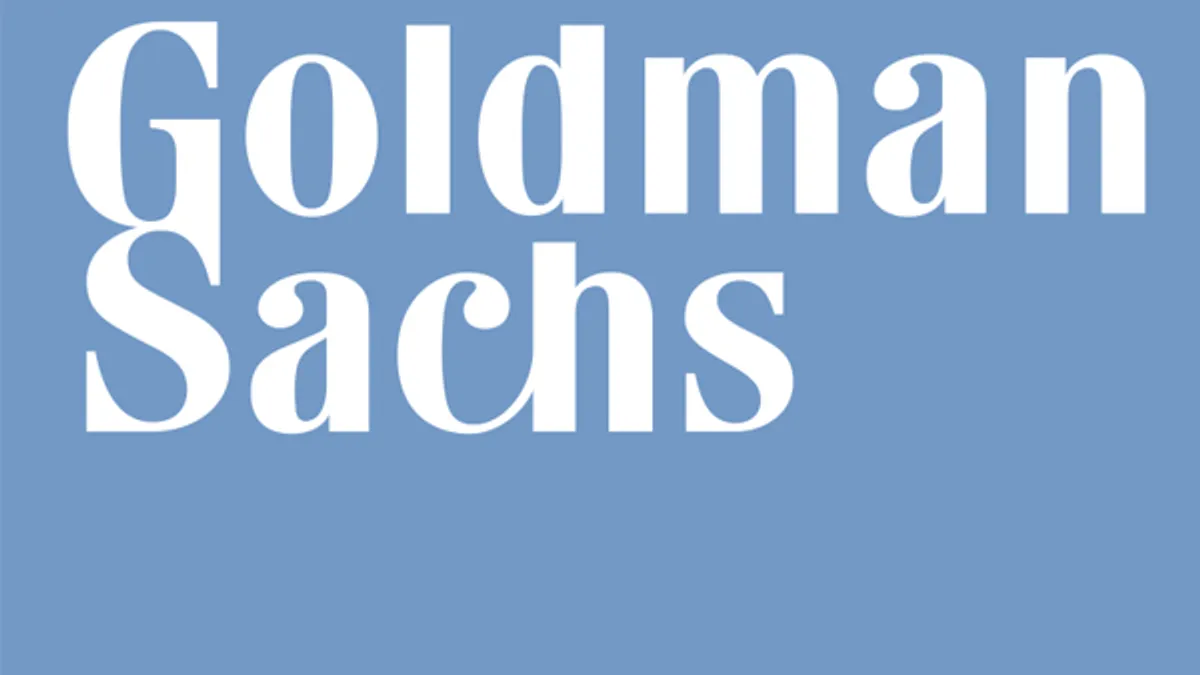Dive Brief:
- Goldman Sachs will require its employees and clients to show proof of vaccination against COVID-19 before entering its offices beginning Sept. 7, according to a Tuesday memo. Employees who are not fully vaccinated by that date will be expected to work from home, the bank said.
- The bank, beginning Wednesday, will also require office occupants to wear masks, regardless of their vaccination status, in common areas such as lobbies, elevators, hallways and restrooms, except while seated for eating and drinking, Bloomberg reported. Local health guidelines in such areas as San Francisco and Washington will also require individuals to wear masks at desks.
- Fully vaccinated employees, beginning Sept. 7, will be required to submit to weekly COVID testing — a change to a policy that now applies only to unvaccinated or partially vaccinated, the Financial Times reported.
Dive Insight:
The revision to Goldman’s vaccination policy comes a day after the Food and Drug Administration granted full approval to Pfizer and partner BioNTech’s COVID-19 vaccine.
The policy shift also makes Goldman’s mandate the toughest among the largest U.S. banks — matching Citi in strictness but requiring a tighter turnaround. Citi this month announced it is requiring employees in New York City, Chicago, Boston and Philadelphia to get vaccinated before they are asked to return to the office Sept. 13.
Goldman’s timeline and stringency also one-ups Morgan Stanley, which said last week it will require employees working from its offices to provide proof of vaccination by Oct. 1. However, the bank does not require mask wearing in its New York headquarters. Morgan Stanley restricted unvaccinated employees and clients from its New York-area offices beginning in July but took people at their word over vaccination status.
Two European banks, meanwhile, have tweaked their own policies toward U.S. employees. Deutsche Bank first announced it would only allow fully vaccinated employees on its U.S. trading floors, citing difficulty in maintaining social distance, then expanded that guidance to restrict unvaccinated staff, vendors and clients from entering its New York headquarters.
Credit Suisse, meanwhile, told its U.S. employees it would postpone its "full return to the office" until Oct. 18, Business Insider reported Tuesday, citing anonymous sources and a memo issued last week. The memo credited "the Delta variant's higher contagion rates" for the altered timeline.
The Swiss bank's employees had been asked to resume "regular full time, in-office work" Sept. 7, the bank’s leaders said this spring. The bank’s offices opened June 14 to vaccinated staff on a voluntary basis. Employees may still come in voluntarily, last week’s memo indicated, but must be vaccinated to do so. Those who have already returned to the office should continue to come in but are not obliged to get vaccinated, the bank said in the memo.
Credit Suisse employees are required to wear masks in common areas such as the lobby, gym or cafeteria but can remove them once they’ve reached the floor where they work, Bloomberg reported.
The Swiss lender is hardly the only bank to push back its office-return timeline. Wells Fargo has delayed its office-return date to Oct. 4. Truist has pushed back the next phase of its reopening from Oct. 1 to later that month or in November. U.S. Bank has postponed its office return indefinitely. And Capital One has delayed its proposed return to Nov. 2 and will require all office-based employees to be vaccinated beforehand.
As for Goldman Sachs, staff can get vaccinated at many of the company’s on-site health centers, the bank said, according to The Wall Street Journal. Employees get a half-day of paid time off for each dose, the publication reported.
Goldman’s policy shift comes as medical organizations and the White House pushed similar protocols.
"The way to regain the upper hand in this fight is requiring vaccinations — specifically vaccine mandates," Gerald Harmon, president of the American Medical Association, said in a statement Tuesday, according to the Financial Times.
President Joe Biden, according to The Wall Street Journal, urged private-sector employers to make vaccines mandatory. "I call on you to do that — require it," he said.
The Business Roundtable, meanwhile, urged state and local policymakers "to support — not impede — companies’ ability to make such a decision."
The U.S. averaged about 141,100 infections a day in the week that ended Monday, according to the Centers for Disease Control and Prevention. That marks a seven-month high and represents a 1,110% increase from the seven-day average at 2021’s lowest rate, in mid-June, the Financial Times reported.













